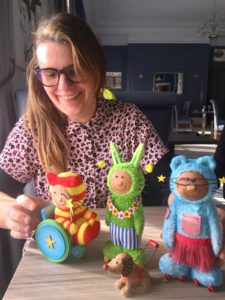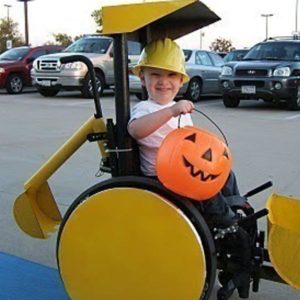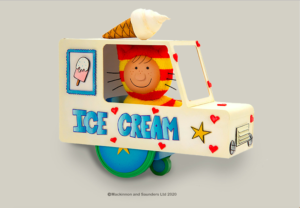MixMups, the new stop-motion animated pre-school series created by #ToyLikeMe’s own Rebecca Atkinson comes with one mantra: There is always another way.
Currently in production under the expertise at Raydar Media and an extended ‘dream team’ comprising some of the kids’ entertainment space’s most influential names, MixMups is the animated embodiment of actual change.
Put into development in the midst of strict lockdown measures across the UK, Atkinson’s project is one that has taken to life amid a challenge to the status quo. Meetings are held remotely, schooling is being conducted in the home, and the talent behind the production of the series has found a way to make the concept animatic, all while practising social distancing.
On top of this, MixMups is on the precipice of a moment of great change. By placing disability at the very centre of its narrative, and visible within a mainstream pre-school TV show, it’s in Atkinson’s own words that “changing the children’s industries to make them more inclusive is possible.”

Aimed at three to five year olds, MixMups follows three friends, Pockets, Giggle, and Spin and their magic mixable dress-up box. With a wooden spoon they mix up the magic inside the box, and are transported on dress-up adventures. During these adventures they meet the Lucky Loover Bird, their guide and philosophiser of the message that ‘There is always another way.’
“There is always another way is something of a metaphor for disabled living,” Atkinson, the show’s creator and founder of the #ToyLikeMe movement, tells Licensing.biz. “Disabled people, and I include myself here, are expert problem solvers. Much of the time, having a disability is about working out other ways to do things. But the show’s mantra is also a universal message for all children about resilience and problem solving.”
Key to the show is that two of its characters have physical disabilities. Pockets is partially sighted and has a lazy, but dutiful, guide dog called Yappette, and Giggle is a wheelchair user who has an assistance guinea pig on tiny roller skates. Together, the MixMups live in a Helter Skelter home constructed with integrated wheelchair access with a lift, walkways, and automatic doors.
In MixMups, Atkinson has created a world accessible to children living with disabilities; one starkly different to that she – being partially sighted and partially deaf herself – grew up in.
“I am very inspired by the British seaside, but most rides are off limits to children with wheelchairs because design has excluded them,” she says. “I wanted to create a world for the MixMups that was designed to include everyone.”
Another major inspiration for MixMups is the phenomena of wheelchair fancy dress, which sees children with wheelchairs and their parents create large cardboard structures to transform their chairs into whatever their imagination can create, be it an ice cream van, a digger, a rocket, the potential is boundless.
“Fancy dress allows children to be anything they dream of, while the concept of MixMups allows these disabled characters to break out of any stereotypes,” Atkinson says. “They can be literally anything they choose. It’s all about play, fun, and possibility.”

MixMups is the culmination of five years of hard graft. In 2015, Atkinson established the #ToyLikeMe movement, a campaign to bring about better representation and inclusivity of disability within the children’s industry. Over the years, Atkinson has been instrumental in much of the change the toy and entertainment space has seen to date. Today we are beginning to see Barbie dolls with wheelchairs, others with cochlear implants, and play-sets embracing accessibility. MixMups is now Atkinsons chance to truly bring the message to the mainstream.
“I wanted to create a comical mainstream brand, bursting with fun and colour, which would be compelling to all children and which would translate with ease into consumer products,” she says.
“I wanted to move the aesthetics of disability on from tired stereotypes and create a playful brand which was unapologetic, and really welcomed and celebrated disabled children, while maintaining really strong mainstream commercial appeal.”

Atkinson makes no secret of the matter that MixMups was developed with toys, publishing, and consumer products in mind from the get-go. In fact, it’s something she wears with pride: the chance to bring a ground-breaking new brand that talks openly about disability – with it embedded in its DNA – to the mainstream, is exactly what her #ToyLikeMe campaign is all about.
“I wanted to truly fulfil the remit of the #ToyLikeMe campaign and see real consumer choice when it comes to disability representations,” she says. “The brand has play schemas embedded in the format and design. MixMups consumer products will be as innovative and creative as the show itself, so expect something quite extraordinary here too.”
Under the guidance of Valerie Fry, an expert in the field of licensing consumer products and the founder of FryDay Brands, MixMups is on a mission to find the kind of partners who understand and resonate the passion of MixMups and its goal of bringing change to the industry. Alongside this, Atkinson is looking to license the Loved By ToyLikeMe endorsement on all products, to help support awareness raising work of the campaign in schools.
Valerie Fry is one part of the ‘dream team’ that Atkinson has assembled around the MixMups brand and its mission statement. A cast of talented and experienced individuals, including Debbie MacDonald (former VP at Nickelodeon) as script editor, Alison Rayson (Raydar Media) as executive producer, Chris Bowden and Andy Burns at McKinnon and Saunder (who have worked on Postman Pat, Raa Raa, and Moon and Me) producing and directing, and with Karen Newell (formerly of Ragdoll) across children’s response testing, each have a first hand experience of living with disability. It’s given the team the ability to make that experience a central part of the series.
At the heart of it, MixMups comes with a real potential to not only change the lives of the some 150 million disabled children worldwide through better representation in the mainstream, but changing the face of the mainstream altogether.
“The little kid in me is hopping around on the ceiling to have reached this point,” says Atkinson. “I just love what I do. I’m very lucky to have the most incredible, creative problem-solving job I could wish for. I love the way that because disability is such uncharted waters in children’s industries, there is just so much creative potential to explore.”












